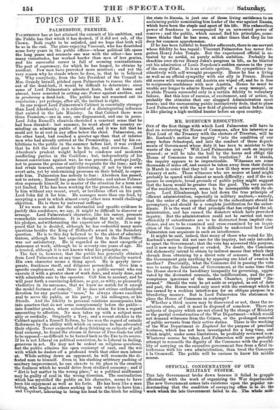MR. ROEBUCK'S RESOLUTION.
Ore of the first things with which Lord Palmerston will have to deal on reentering the House of Commons, after his interview as First Lord of the Treasury with the electors of Tiverton, will be Mr. Roebuck's motion for inquiry "into the condition of our army before Sebastopol, and into the conduct of those depart- ments of Government whose duty it has been to minister to the wants of the army." Will Lord Palmerston let such an inquiry proceed • or will he take the bull by the horns and oblige the House of Commons to rescind its resolution ? As it stands, the inquiry appears to be impracticable. Witnesses are some thousands of miles off, and cannot be taken away from their duties in March in order that they tell us how ill they were provided in January et ante. Those witnesses who are nearer at hand might probably be spared with almost as much difficulty ; and if the ex- posure be complete, broad grounds of public policy might suggest that the harm would be greater than the good. The very nature of the resolution, however, seems to be incompatible with its ob- jects. Lord Ellenborough has laid down the true principle of efficient administration, especially in military matters,— namely, that the order of the superior officer to the subordinate should be peremptory, and should be a complete justification for the subor- dinate. It is the want of that principle-that-has crippled the ad- ministration, and has caused the disasters which have provoked inquiry. But the administration could not be carried out more efficiently if subordinates are to be distracted from implicit obe- dience, and are to be examined and cross-examined by an inqui- sition of the Commons. It is difficult to understand how Lord Palmerston can acquiesce in such an interference.
It might be said, indeed, that many of those who voted for Mr. Roebuck's motion did not care for the inquiry, but only intended to upset the Government; that the vote has answered this purpose, and it now may be dropped or evaded. No doubt, the Commons did dishonestly intend to obtain by indirect means that which they shrunk from obtaining by a direct vote of censure. But would the Government gain anything by opposing one kind of evasion to another? Practically, what the Commons did in passing the vote was to usurp the functions of Government, at the same time that the House showed its hereditary incapacity for governing, aggra- vated by the distracted counsels, the indifferentism, and the pre- sumptuous ignorance of the modern Chamber, yeleped " Re- formed." Should the vote be set aside or crippled, as out of date and past, the House would only meet with the contempt which it has earned by a reckless interference for an oblique purpose in a blundering manner. But is Lord Palmerston the statesman to place the House of Commons in contempt ?
Whether a third course may be discovered or not, there the re- solution stands, and it must be disposed of somehow. There are sub'ects of inquiry which are not closed by the change of Ministry or the partial reconstruction of the War Department—which would not demand witnesses from the Crimea, or the prolonged removal of public servants from their active duties. There is the working of the War Department in England for the purpose of practical business, which has not been investigated for a long time, and which might, under some limitations, be profitably reviewed now. Whatever course he takes, Lord Palmerston will more probably attempt to reconcile the dignity of the Commons with the possibi- lity of carrying on the executive government free from a fatal in- terference with his own administration, than treat the Commons a la Cromwell. The public will be curious to know his middle course.


































 Previous page
Previous page